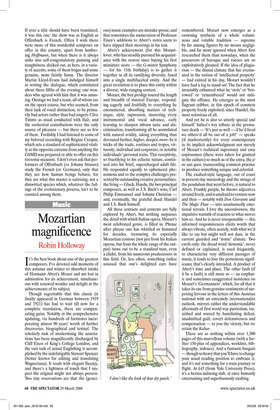Mozartian magnificence
Robin Holloway
It’s the best book about one of the greatest composers. I’ve devoted odd moments of this autumn and winter to absorbed intake of Hermann Abert’s Mozart and am lost in admiration for its achievement, simultaneous with renewed wonder and delight at the achievements of its subject.
Though regrettable that this classic (it finally appeared in German between 1919 and 1921) has had to wait till now for a complete translation, there are compensating gains. Notably in the comprehensive updating, via hundreds of footnotes incorporating almost 90 years’ worth of further discoveries, biographical and textual. The scholarly task of modernising the annotations has been magnificently discharged by Cliff Eisen of King’s College London, and the vast task of actual Englishing is accomplished by the indefatigable Stewart Spencer (better known for editing and translating Wagneriana). It reads with elegant fluency, and there’s a lightness of touch that I suspect the original might not always possess. Two tiny reservations are that the (gener ous) music examples are mistake-prone; and that sometimes the numeration of Professor Eisen’s additions to Abert’s notes seem to have slipped their moorings in his text.
Abert’s achievement (for this Mozartlover, who has steadily pursued his acquaintance with the oeuvre since buying his first miniature score — the G-minor Symphony — for his 11th birthday) is to gather it together in all its ramifying diversity, fused into a single multifaceted entity. And the great revelation is to place this entity within a diverse, wide-ranging context.
Mozart, the boy prodigy toured the length and breadth of musical Europe, responding eagerly and fruitfully to everything he encountered, absorbing matters of technique, style, expression, mastering every instrumental and vocal advance, early learning to sharpen inborn taste and discrimination, transforming all he assimilated with natural avidity, taking everything thus devoured further, higher, deeper, more: be it tricks of the trade, routines and tropes, virtuosity, individual and corporate, or notable individuals’ personal traits. This receptivity, so fructifying to his eclectic nature, continued into his brief, supercharged adult life. He responded equally to ephemeral phenomena and to the complex challenges presented by outstanding creative personalities: the living — Gluck, Haydn, the two principal composers, as well as J.S. Bach’s sons, Carl Philip Emmanuel and Johann Christian — and, eventually, the grateful dead: Handel and J.S. Bach himself.
All these contacts and contexts are fully explored by Abert, but nothing surpasses the detail with which Italian opera, Mozart’s most celebrated genre, is filled in. Phrase after phrase one has whistled or hummed for decades, treasuring its especially Mozartian contour (not just from his Italian operas, but from the whole range of the output) turns out to be a standard turn, even a cliché, from his numerous predecessors in this field. Or, less often, something rather unusual that one’s delighted ears have remembered. Mozart now emerges as a crowning synthesis of a whole voluminous and voluble tradition — supreme by far among figures by no means negligible, and far more ignored when Abert first researched them than nowadays, when the precursors of baroque and rococo are so exploitatively gleaned. If the idea of plagiarism — the dismal climate that has eventuated in the notion of ‘intellectual property’ — had existed in his day, Mozart wouldn’t have had a leg to stand on! The fact that he invariably enhanced what he ‘stole’ or ‘borrowed’ or ‘remembered’ would not mitigate the offence. He emerges as the most flagrant cribber, in this epoch of common property freely exploited, since Handel, the most notorious of all.
And yet he is also so utterly special and himself. Salieri’s wry tribute at the premature death — ‘It’s just as well — if he’d lived we others’d all be out of a job!’ — speaks (if inadvertently) for every contemporary in its implicit acknowledgment not merely of Mozart’s technical supremacy and easy copiousness (these were taken for granted in the culture) so much as of the extra, the je ne sais quoi, transcending common practice to produce something unique and celestial.
The exalted-style language, out of court in present-day musicology and the swings of the pendulum that went before, is natural to Abert. Frankly purple, he throws adjectives around freely, and is unafraid to venture now and then — notably with Don Giovanni and The Magic Flute — into unashamedly emotional terrain. I love the uncostiveness, the impulsive warmth of reaction to what moves him so. And he is never irresponsible — this informed responsiveness elicits words that always vibrate, often acutely, with what we’d like to say but might well not dare, in the current guarded and ‘ironic’ climate. Two cavils only: the dread word ‘demonic’, never defined or explained, is used frequently, to characterise very different passages of music; it tends to lose the portentous significance that’s clearly intended. A product of Abert’s time and place. The other fault (if it be a fault) is still more so — an emphatic and sometimes exaggerated insistence on Mozart’s ‘Germanness’, which, for all that it takes its cue from genuine sentiments of surprising fervour in the letters of this Austrian national with an extremely internationalist outlook, mirrors rather the understandable aftermath of first world war patriotism, tarnished and soured by humiliating defeat, unadmitted guilt, covert defensiveness and compensation — to you the victory, but we retain the Kultur.
These are as nothing within over 1,300 pages of this marvellous volume (with a further 150-plus of appendices, worklists, bibliography, indexes). And a fantastic bargain — though so heavy that you’ll have to change your usual reading position to embrace it, and it’s not something for a train journey or flight. At £45 (from Yale University Press), it’s a hernia-inducing slab, at once humanly entertaining and superhumanly exalting.
















































































 Previous page
Previous page